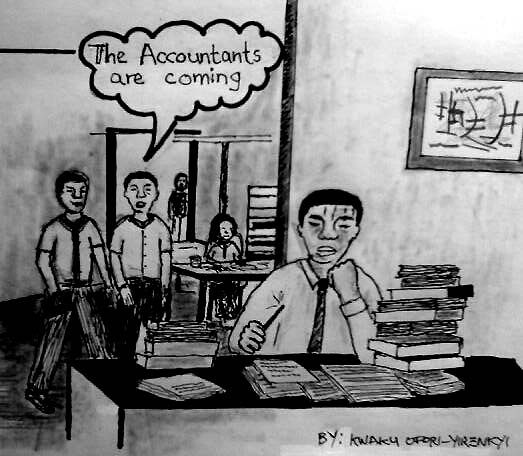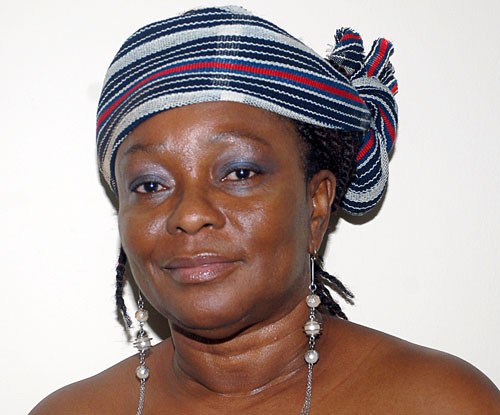Ghana is rising! Accountants must count the cost
 Without a doubt, things are getting better in Ghana. The ‘better’ here has no political party connotation at all (as in a ‘Better Ghana’ agenda) because slogans do not put food on the dining table (if you have a table at all). When you look back, say—20 years, the quality of life for more people has improved. Many have succeeded in dragging themselves out of decaying poverty. But deep wounds don’t heal easily and fast. They require lots of tender loving care with the right medication to heal. Binding deep wounds in bandages do not lead to healing; they only fester.
Without a doubt, things are getting better in Ghana. The ‘better’ here has no political party connotation at all (as in a ‘Better Ghana’ agenda) because slogans do not put food on the dining table (if you have a table at all). When you look back, say—20 years, the quality of life for more people has improved. Many have succeeded in dragging themselves out of decaying poverty. But deep wounds don’t heal easily and fast. They require lots of tender loving care with the right medication to heal. Binding deep wounds in bandages do not lead to healing; they only fester.
So where is the road?
There is this worrying story I first heard from my friend Kofi Howard that was retold recently by Mr John Klinogo, a past President of the Institute of Chartered Accountants, Ghana (ICAG). At the centre of the story are two ministers of roads and transport from the Third World: one from a Latin American country and the other from a West African country. The story has it that during a ministerial conference on roads and transport in the Latin American country, that country’s minister invited his counterparts to his home for a cocktail. The ministers marvelled at his grandiose mansion. The West African minister of transport soberly asked the host minister, “How did you find money for this?” The Latin American minister whispered, “Did you see the pothole-infested roads we drove on to get to this mansion? I used 10% of the road money.”
Three years later, there was another conference for ministers of roads and transport in a West African country. In the proverbial African hospitality fashion, the host African minister extended an invitation to the colleague minsters to visit his home for a cocktail. It was a major opportunity to brag and show off his raw unbridled shameless success. As they entered, the guests could not conceal their shock at the plush majestic mighty edifice fit for a king. So the Latin American minster got closer to our home-boy African minister, “You have a mansion that is larger and more obscene than mine! How did you do it?” To answer that tricky question, our West African minister of roads and transport belched loudly and laughed the rich-man’s laughter, laced with impunity. He replied matter-of-factly, “100 per cent!”
His guests could not understand his answer so he set out to explain the matter fully. He promptly arranged to take his guests out on a tour to see road projects. They drove in several V8-engine vehicular convoy into the hinterlands on dirt bumpy roads that had never seen tar since Adam was a school boy. As they arrived at a large stretch of land, he stopped the convoy and asked his guests, “Do you see the fine road ahead?” They asked, confused: “Which road?” He replied again, pointing at the bushes: “That is the 100 per cent of the money for the road construction!”
Apparently, where they had packed the vehicles should have been the middle of a major highway. But the road was never constructed; yet, the minister built a senseless mansion for himself out of the country’s coffers by diverting the money that should have been used to improve the quality of life of the citizenry. The West African minister chopped 100 per cent because he could do so without an iota of fear of being caught, let alone to face the consequences. In the absence of a system that makes our leaders and technocrats accountable, and the entrenchment of a system that is transparent to the extent of stopping or at least curbing impunity, corruption flourishes.  If accountants were vigilant, such hypothetical stories would not even make it into the public space. The story is at once funny and sad; it is unacceptable. Unfortunately, such things do happen with the management of public resources. What you don’t inspect should not be expected. Similarly, what you inspect and unveil as unacceptable should be exposed for all to see and for corrective actions to be taken. Sanctions should be meted out whenever there is the need.
If accountants were vigilant, such hypothetical stories would not even make it into the public space. The story is at once funny and sad; it is unacceptable. Unfortunately, such things do happen with the management of public resources. What you don’t inspect should not be expected. Similarly, what you inspect and unveil as unacceptable should be exposed for all to see and for corrective actions to be taken. Sanctions should be meted out whenever there is the need.
Bad governance is the bane of Africa and typically, we’re projected among the community of nations as the dysfunctional continent. From time immemorial, they called us the ‘dark continent’. In the name of the slave trade, they staged a brutal relocation of our people to toil to build other people’s civilization whilst ours remained in underdeveloped funk—and colonized. But it has been a long while since those painful days of history.
Enters accountants as citizens:
Accountants are citizens of Ghana and Africa with a professional mandate to push us to get our funky acts together. By the nature of their work, the true essence of the responsibility of accountants should be to enhance accountability and good governance. Anything short of that in a country is a failure of the accountancy profession. If accountants don’t lift the veil for us to view the hidden happenings in the management of the public resources we entrust to public office holders, who else can tell us? It is very easy for public officials to forget that the citizens continue to hold sovereignty, and that they are only custodians—for a short while.
The role of public officials (politicians and technocrats) is to manage our resources on our behalf for the intended purposes in ‘an efficient, economic and transparent manner’ and to provide us with accurate and timely reports. Anything short of that constitutes a mission unaccomplished. May is a month of reflection for African countries because the 25th day is celebrated as Africa Day for a continent that has, for the most part, chosen the path of democracy. After all, democracy and accountability are lovely bed-fellows. It is the role of professional accountants to count the cost for us.
This week, Accra hosted over 1,000 professional accountants from all over the continent and beyond for a three-day second African Congress of Accountants (ACOA) at the International Conference Centre. I was there! Certain professions appear to be so distant and out-of-reach so I wanted to check things out for myself and to learn. Typically, when corporate leaders hear of accountants coming to conduct audit, they panic and shiver. The accountant’s role is such that he/she shines light in dark places by looking through the books. The congress was under the theme: Africa’s economic growth, accountability and democracy. When accountants speak, we must listen.
Cancer of growth:
Ghana is rising. Africa is rising. Africa is continuously being mentioned as the new global investment frontier; Ghana is the darling chic. Investors are coming to the continent to explore immense opportunities. Private capital is increasing. For democracy to work in Africa, accountants should rise to the challenge. Four-year-cycle elections are not enough; our leaders must be held accountable. Accounting books must be open and made meaningful so we can make sense of the figures that spell out the state of management/mismanagement of our resources.
Truly, in recent years, African countries are doing better with growth. But not all growth is healthy growth. Some growth can be cancerous. GDP is meaningless in the pocket. Lack of access to water, food, housing, roads and life-saving hospitals, and freedom to live decent lives; unacceptable sanitation and plundered environment should not be tolerated. If through high-level professional accounting, our resources are managed well, the resource-rich people of the continent of Africa will live dignified lives and not remain as second/third rate citizens of planet earth.
Written by Dr Doris Yaa Dartey
Email: [email protected]
